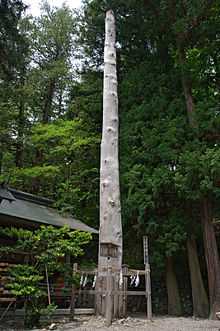Onbashira

Onbashira (御柱) is a festival held every six years[1] in the Lake Suwa area of Nagano, Japan. The purpose of the festival is to symbolically renew the Suwa Taisha or Suwa Grand Shrine. "Onbashira" can be literally translated as "the honored pillars".
The Onbashira festival is reputed to have continued, uninterrupted, for 1200 years. The festival is held once every six years, in the years of the Monkey and the Tiger in the Chinese zodiac, however the locals may say "once in seven years," because of the traditional Japanese custom of including the current year when counting a length of time.
Onbashira lasts several months, and consists of two segments, Yamadashi and Satobiki. Yamadashi traditionally takes place in April, and Satobiki takes place in May.
"Yamadashi" literally means "coming out of the mountains." Before this portion of the festival, huge trees are cut down in a Shinto ceremony using axes and adzes specially manufactured for this single use. The logs are decorated in red and white regalia, the traditional colors of Shinto ceremonies, and ropes are attached. During Yamadashi, Teams of men drag the logs down the mountain towards the four shrines of Suwa Taisha. The course of the logs goes over rough terrain, and at certain points the logs must be skidded or dropped down steep slopes. Young men prove their bravery by riding the logs down the hill in a ceremony known as "Ki-otoshi."
"Satobiki" festival involves the symbolic placement of the new logs to support the foundation of the shrine buildings. The logs are raised by hand, with a ceremonial group of log bearers who ride the log as it is being raised and sing from the top of the log to announce the successful raising. This ceremony was performed as part of the opening ceremonies of the Nagano Olympics in 1998.
After two festivals, there is an important event "Building of Hoden". This event isn't generally famous, and few people know that the event is held even among people who live nearby and participate in Yamadashi and Satobiki. The end of this event marks the end of Onbashira.
References
- ↑ in Japanese 6年(数えで7年)に1度行われる (that is, 7 years according to the old style of counting and 6 years to the new style; see http://mainichi.jp/select/jiken/news/20100412k0000m040039000c.html or http://www.taipeitimes.com/News/taiwan/archives/2004/04/11/2003136206